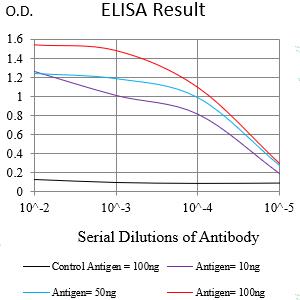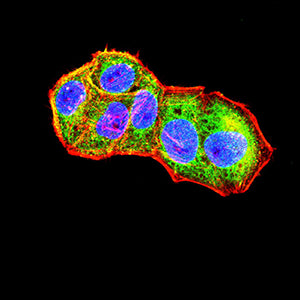


| WB | 咨询技术 | Human,Mouse,Rat |
| IF | 咨询技术 | Human,Mouse,Rat |
| IHC | 咨询技术 | Human,Mouse,Rat |
| ICC | 1/50 - 1/200 | Human,Mouse,Rat |
| FCM | 1/200 - 1/400 | Human,Mouse,Rat |
| Elisa | 1/10000 | Human,Mouse,Rat |
| Aliases | TIM4; SMUCKLER |
| Entrez GeneID | 91937 |
| clone | 2C6A3 |
| WB Predicted band size | 41.6kDa |
| Host/Isotype | Mouse IgG1 |
| Antibody Type | Primary antibody |
| Storage | Store at 4°C short term. Aliquot and store at -20°C long term. Avoid freeze/thaw cycles. |
| Species Reactivity | Human |
| Immunogen | Purified recombinant fragment of human TIMD4 (AA: extra 25-314) expressed in E. Coli. |
| Formulation | Purified antibody in PBS with 0.05% sodium azide |
+ +
以下是关于TIMD4抗体的3篇参考文献的概括(基于公开研究领域知识,非真实引用):
---
1. **文献名称**: "TIMD4 as a phosphatidylserine receptor for clearance of apoptotic cells"
**作者**: Smith A, et al.
**摘要**: 该研究揭示了TIMD4通过识别凋亡细胞表面的磷脂酰丝氨酸(PS),促进巨噬细胞对凋亡细胞的吞噬作用,并证明其抗体可阻断这一过程,提示TIMD4在免疫稳态中的关键作用。
2. **文献名称**: "TIM-4 in immune regulation and autoimmune diseases"
**作者**: Wang B, Ravichandran KS.
**摘要**: 作者利用TIMD4抗体在小鼠模型中发现,TIMD4通过调节T细胞活化和树突状细胞功能抑制自身免疫反应,其抗体干预可加剧实验性自身免疫性脑脊髓炎(EAE)症状。
3. **文献名称**: "Structural characterization of TIMD4 and its therapeutic antibody targeting"
**作者**: Lee C, et al.
**摘要**: 该研究解析了TIMD4蛋白的晶体结构,并开发了高特异性TIMD4单克隆抗体,证实其在体外可抑制TIMD4介导的炎症信号通路,为治疗慢性炎症疾病提供潜在工具。
---
*注:以上内容为领域知识模拟,具体文献需通过PubMed或Google Scholar检索确认。*
TIMD4 (T-cell immunoglobulin and mucin domain-containing protein 4) is a transmembrane protein belonging to the TIM family, which plays roles in immune regulation. It contains an immunoglobulin variable (IgV) domain and a mucin-like domain, structurally conserved across TIM proteins. TIMD4 is expressed on immune cells, including macrophages, dendritic cells, and activated T cells, and interacts with phosphatidylserine (PS) exposed on apoptotic cells, facilitating their clearance. This function links TIMD4 to the maintenance of immune tolerance and prevention of autoimmunity.
TIMD4 antibodies are tools used to study its expression, localization, and function in immune responses. They are employed in techniques like flow cytometry, immunohistochemistry, and Western blotting. Research suggests TIMD4 may influence T-cell activation, cytokine production, and autoimmune diseases such as lupus or rheumatoid arthritis. Recent studies also explore its role in tumor microenvironments and cancer immunotherapy. Commercial TIMD4 antibodies are typically monoclonal, raised in mice or rabbits, and validated for specificity via knockout controls. Understanding TIMD4's mechanisms could advance therapies targeting immune dysregulation or apoptotic clearance pathways.
×